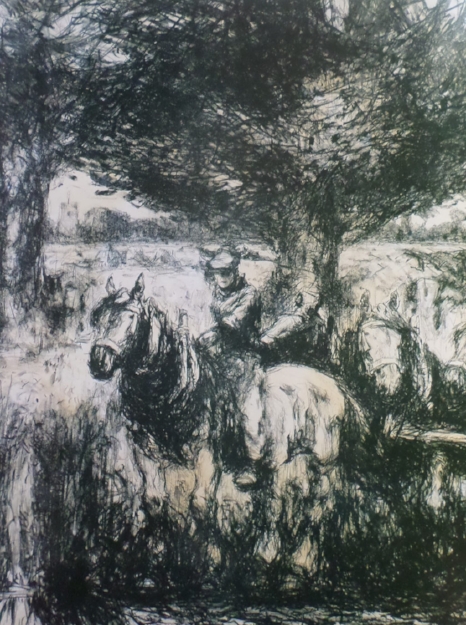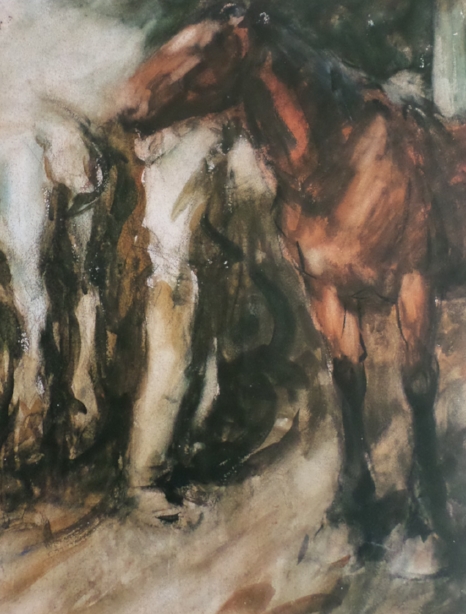It was the period that Harry Becker spent at the Bushey School of Art in Hertfordshire, under the guidance of painter Hubert von Herkomer, that seems to have reinforced Becker's interest in social realism, the downtrodden farmer labouring underclasses and his ability as an equine artist.
Harry Becker trained at some of the best establishments in Paris and Antwerp where he was first exposed to painting scenes of manual farm labour on Dutch farms and to the techniques of 'belle peinture' and 'plein air' by Carolus-Duran. But it was back in Hertfordshire that these skills were further developed ready to be honed out in the fields. Hertfordshire introduced Becker to two significant women painters , the first was Lucy Kemp-Welch who is one of our favourites here at Blondes Fine Art and is considered to be one of our finest equine artists. The other was Georgina Waddington who was also a talented artist and fell in love with Harry Becker, marrying in 1902 at the age of 35 years. So clearly Hertfordshire had a significant role in the life of Becker.
His love of animals became a growing part of his artistic portfolio as he painted the working dray horses and bus horses in West London near his home. He lived close by the stables for the bus horses and produced a series of paintings in body colour on paper of a particular pair of horses, a grey and bay being groomed and cared for in the stable. These are illustrated on pages 62 -65 of the book 'Becker' by David Thompson and we are particularly proud to have the one shown below in our personal collection of work by Harry Becker together with the huge (40 x 48") lithograph depicting 'The Binder Team'. Also shown below.
Becker is without question a fine artist whose ability to depict working horses is in line with those skills of Luck Kemp-Welch, but where his experiences differ are in his personal knowledge of hardship. Becker turned his back on London and the capitals art scene in favour of his native East Anglia. During the first world war times were hard , particularly for those working the land in Suffolk. Women , while the men were away, took to the land from about 1915 and Becker was there working in the fields with them depicting their contribution. Becker was commissioned to produce posters shown on the London underground that encouraged travel to the countryside and to work on the land. It is also slightly ironic that his suspicious sketching at the edge of fields resulted in him being arrested on more than one occasion only to be released when they realised that he was not a German spy.
Becker lived in poverty together with the farm workers and was very much accepted as one of their own. His depiction of rural Suffolk in the period from 1912 - 1928 is a unique record of the landscape, animals and farming folk who endured great hardship to just scrape a livelihood and his status as an outstanding artist continues to grow. We are great fans of his work and currently have a number of outstanding oils and watercolours available for sale so do please contact us to arrange to view or just to chat Becker!
Mark Ponting - Blondes Fine Art

